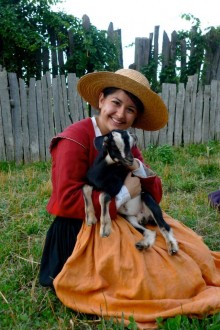Multi-tasking at a Living History Museum
 Molly Cardoza, Class of 2014, spent the summer as a 2012 Material Culture and Collections Management Intern at Plimoth Plantation in Plymouth, MA, an opportunity supported by a grant from the Wheaton Fellows Program. Through her work-study position with the Permanent Collection, Molly already had experience accessioning and researching objects and she expected to do similar work at Plimoth Plantation. She quickly discovered, however, that multi-tasking is a way of life in the museum world! Here’s her story:
Molly Cardoza, Class of 2014, spent the summer as a 2012 Material Culture and Collections Management Intern at Plimoth Plantation in Plymouth, MA, an opportunity supported by a grant from the Wheaton Fellows Program. Through her work-study position with the Permanent Collection, Molly already had experience accessioning and researching objects and she expected to do similar work at Plimoth Plantation. She quickly discovered, however, that multi-tasking is a way of life in the museum world! Here’s her story:
My first day at Plimoth Plantation I walked in expecting to work with my supervisor Karin and another intern. By the end of the day, I realized just how wrong I was. Within three hours, I had met everyone from the Director to the maintenance crew and the women who worked in the gift shop! I had also made the false assumption that I would not do any “real” work for at least a couple of days, but by the end of the first day, I was already at work on an interactive demo exhibit designed to give children a hands-on look at crafting in the 17th century.
Throughout the summer, I often thought back to the internship job description and realized that I was doing so much more! I created hands-on demos illustrating the creation of English and Wampanoag fishing nets, sgraffito (a pottery technique), and English timber framed house building, and I developed information packets for each demo and taught them several hours each week in the Craft Center. I also worked on an audio tour script for the Mayflower II, maintained various exhibits, and conducted research for patrons.
While learning museum ethics was not a focus of my internship, I feel that I was introduced to a number of aspects regarding the ethical collection of historic artifacts, specifically those related to the Wampanoag, as Plimoth Plantation hosts the extensive Wampanoag Indigenous Program (WIP) and holds a collection of historic Wampanoag artifacts. I also learned a great deal about the ethics of maintaining a collection of artifacts and working with donors of new objects. For an object to be accessioned into the collection, many steps must be taken, including the signing of deeds of gift, the writing of letters of acknowledgement, and, of course, researching and documenting the object and its donor. These tasks taught me a great deal about the character of the institution and about my own values and flexibility when presented with a set of ethical guidelines that may differ from my own.
The internship was one of the most rewarding learning experiences I have ever had. The multitude of tasks I performed and the responsibility I was given were incredible and how very much I learned was just amazing. Among so many other skills and experiences I gained, I now can confidently say that I know how to make a 17th-century English fishing net by hand!
-
Categories:
- Permanent Collection